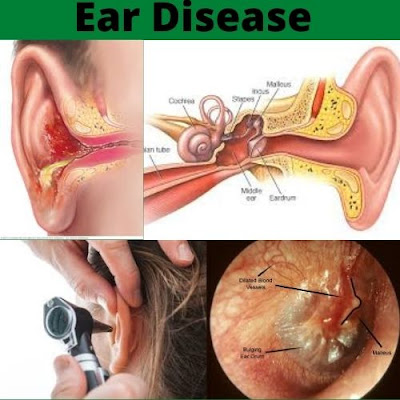Health popularization: What are the common ear diseases?
These diseases may be hidden behind tinnitus
Source: People | Author: Anonymous | Font Size: A + | A-
At the end of the year, many people feel that their tinnitus becomes more serious because of irregular work and rest schedules, bad emotional states, too much pressure, and staying up late. So, do your ears often make tinnitus inadvertently? Do you know what diseases are hidden behind tinnitus? How should we treat tinnitus? Let us listen to what the otolaryngology experts say.
The cause of tinnitus is complex
Zhu Xiaoyan, deputy chief physician of the Department of Otolaryngology, Nanjing Hospital of Integrated Traditional Chinese and Western Medicine, said that tinnitus is not only caused by ear diseases, but sometimes may be an early sign of systemic diseases.
Five ear diseases that are not easy to detect_treatment
1. Ear disease: Conductive tinnitus can occur when foreign bodies in the ear, inflammation and swelling are blocked, eardrum congestion, internal noise, perforation, middle ear effusion or infection, otosclerosis, etc. It is characterized by unilaterality, that is, tinnitus occurs on one side of the lesion, and the pitch is low and rhythmic, such as "rumble" and "rumble."
2. Neurasthenia: tinnitus is also obviously related to social environment and psychological factors. When people are depressed.Tinnitus may also occur when anxious. People with neurasthenia often have tinnitus. The tone of this tinnitus is variable, mostly bilateral, and accompanied by symptoms such as headache, dizziness, insomnia, and dreaminess.
3. Neck diseases: neck swelling and pain or other neck diseases, when the carotid artery is compressed, can cause tinnitus on the side of the compression. This kind of tinnitus is characterized by persistence, low tone, and the degree of tinnitus can vary with body position.
4. Noise damage: short-term strong noise or long-term repeated noise (such as occupational noise, rock music and disco music. Strong volume stereo headphones, etc.) can cause hearing loss accompanied by tinnitus and dizziness. In severe cases, auditory hallucinations and nerves can also occur. weak.
5. Other systemic diseases: Some systemic diseases such as hypertension, coronary heart disease, anemia, hyperlipidemia, hyperthyroidism or hypothyroidism, kidney disease, diabetes, neurodegeneration, inflammation, trauma, drug poisoning, etc. may cause different The incidence of tinnitus is often related to factors such as inner ear microcirculation disorders, endocrine disorders, toxin absorption, and abnormal connections between the cochlea and certain nerve pathways.
17% of people have varying degrees of tinnitus
Deputy Chief Physician Zhu Xiaoyan said that tinnitus refers to a subjective symptom in which the patient perceives sound in the ear or skull when there is no corresponding sound source or electrical stimulation in the outside world. It is often accompanied by sleep disorders, upset, anger, and attention. Inability to concentrate, anxiety, depression and other adverse psychological reactions.
17% of the general population has tinnitus of varying degrees, which is one of the most common clinical symptoms in otology and one of the three major problems in otology. The number of tinnitus patients admitted to this department is increasing year by year. Due to the fast pace of modern society and the increasingly fierce competition, tinnitus patients are now getting younger and younger. Many tinnitus patients suffer from chronic sleep deprivation, heavy work and study pressure, anxiety and depression. Don't be nervous if you have tinnitus, but don't be careless. If your tinnitus does not improve for 1 to 2 days, you must go to the hospital.
"Long Ming must be deaf" has no basis
Here are the following four aspects:
1. Build confidence
Tinnitus is curable. Through systemic treatment, tinnitus can be significantly reduced, and the frequency of tinnitus can be reduced or even disappear, achieving the ideal state of healing and avoiding tinnitus.
2. Clear a concept
Tinnitus that is not accompanied by hearing loss and organic disease, even if it exists for a long time, will not cause deafness. Correcting many people's misconceptions that tinnitus will cause deafness will dispel such doubts.
3. Advocacy of a good lifestyle
Sleep, mood, and diet are the three factors closely related to health. Advising patients to avoid the problems of lack of sleep and poor mood is vital to the improvement and recovery of tinnitus, and can even prevent the occurrence of many other diseases.
4. Give full play to the advantages of Chinese medicine
Traditional Chinese medicine has a lot of unique understanding of the etiology and pathogenesis of tinnitus. For example, in the differentiation of tinnitus, it is necessary to distinguish between the deficiency and the actual. Those who think that the sound of tinnitus is loud and the low tone is mostly empirical, while those with high tone such as cicadas are mostly with deficiency; The louder is more real, the longer the sound is more virtual; the bilateral tinnitus is more real in day and night, and the night is more vacant; the short and rapid sound is more real, the long and uninterrupted sound is more vacant; the hand-pressing sound is aggravated If it is true, if it decreases or stops, it is false.
In terms of treatment, the combination of internal and external treatment of Chinese medicine also has its own characteristics. For example, micro-needle acupuncture at auricular points has the effect of clearing the meridians and activating collaterals, strengthening the body and eliminating evils, improving the microcirculation of the inner ear, regulating endocrine, helping sleep and calming the mind. In winter, it is also used to regulate the use of Ningxin Anshen ointment and other traditional Chinese medicinal ointments, which have multiple functions such as calming the heart, soothing the nerves, helping sleep, replenishing qi, tonifying blood, and invigorating the spleen and stomach. Patients with tinnitus take it. (Correspondent Yang Pu and reporter Cai Yunqi)







No comments